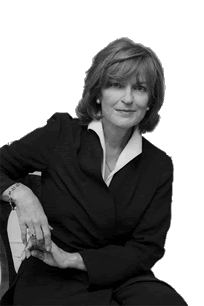
introducing readers to writers since 1995
June 20, 2005
An Author2Author Special: Jim & Kate Lehrer
by Ron HoganUsually, I like to spread Author2Author conversations out over an entire week, but when I received this exchange between Kate Lehrer and her husband, fellow novelist (and NewsHour anchor) Jim Lehrer, it felt less like the usual series of emails A2A authors send each other and more like a marathon chat session. (In fact, I like to imagine the Lehrers at opposite ends of their house, making that little IM jingle at irregular intervals as they send each other notes...) So here it is in one installment; admittedly, it's an experiment in format, so if any of you find this too much to take in all at once, let me know!
 Kate: So how do we influence each other's writing? Let me count the ways.....
Kate: So how do we influence each other's writing? Let me count the ways.....
Jim: Sometimes it's subtle. Sometimes not so. Take my latest book, The Franklin Affair. I had a 40-page one-man play about Ben Franklin in it, and you said it had to come out. Period. No subtlety there.
Kate: I suggested you could put it on the stage, just not in the book. It didn't belong in the book.
 Jim: And in Confessions of a Bigamist, neither did that third man your bigamist was about to take up with. Two husbands were enough for her to keep straight, let alone the reader.
Jim: And in Confessions of a Bigamist, neither did that third man your bigamist was about to take up with. Two husbands were enough for her to keep straight, let alone the reader.
Kate: Yeah, but she was feeling as desperate as I was trying to figure out what she was going to do. I thought a third man might provide a little comic relief for us both.
Jim: Since the whole book is dark comedy with a twist, you weren't lacking in comic relief. You needed to stick to your knitting.
Kate: That last sounds like something I might say.
Jim: Probably because you have. You're always telling me to get back to the storyline.
Kate: You are awfully fond of your riffs. I know they're fun to write, but sometimes they stray a little too long and too far afield. Like that forty-page play.
Jim: I took it out, didn't I?
Kate: And I took out the third man.
Jim: Your bigamist and the reader have enough conflicting pulls already. And she had one too many names. You called her Michelle when she was with her New York husband and Mickey when she was with the guy in Texas and Daisy when she was in her professional life talking about how to simplify life. Then suddenly you called her Michael in flashbacks to when she was growing up. Michael confused me.
Kate: I happen to love the name Michael for a woman. I did give it up, though not without some extra nudging. You also kept nudging me to make both husbands more appealing, and equally so. You pointed out, quite correctly, that the reader had to understand why she felt the need to be married to them both.
Jim: When I was writing The Franklin Affair, you got worried because I have a group of contemporary Franklin historians examining a mystery in Ben's past while they themselves are dealing with a case of present-day plagiarism. You wanted me to be sure that I had the dynamics and backstage dramas right. As a result of your worry, I did show my manuscript to a few who know that world.
Kate: And you turned out to have it just right as has been true for other books you've written. I'm thinking about the two on the CIA and also about The Special Prisoner, about World War II pilots in Japanese prison camps. Franklin is very much set in the present time, making it more urgent to have your details ring true.
Jim: Now that the book is out, I found that early confirmation more reassuring than I'd realized at the time.
Kate: I don't think I've ever told you this, but your early enthusiasm when I told you I wanted to write about a woman bigamist gave me the courage to stick to my guns, especially later when the basic idea got challenged. For that matter, it still does get challenged. I knew I had a risky proposition, but you couldn't have been more supportive from the beginning. That really helped.
Jim: I didn't know. Thank you. As you're so fond of saying, the book is about ambiguity--something almost nobody likes to deal with although all of us do, like it or not.
Kate: Do you think there's any downside to our influence over each other?
Jim: No. Our styles are so different. We don't write either in the same way or about the same things. I think this keeps us from the temptation of turning the other's work into a clone of our own. We not only respect, we relish the difference. Maybe because it is different.
Kate: You are stronger on plot and have helped me a lot there....
Jim: …and you keep telling me to go deeper. When I do, the book gets better.
Kate: When is the operative word. I now know if you haven't taken my advice--whatever it is--you don't show me any more drafts!
Jim: You can be just as stubborn. We also think that when we do advise, the other should consent.
Kate: Yeah, we've had plenty of fights during a "critique," since we both prefer lavish praise to any criticism. I'd say we consent about half the time. What does happen, though, is that we strengthen whatever it was that came under attack: a character's motivation, a clearer paragraph, a muddled plot issue....
Jim: …or wordiness get the hook. The same for those unnecessary characters.
Kate: As with all writers, we both hate taking out our own precious words. But do you sometimes wish you hadn't married a writer? Found someone instead who stopped with appreciating your work but didn't get as obsessed and moody as writers tend to get; found, at the least, someone who got obsessed and moody about different things?
Jim: Nope. One of the best parts we've got going is that we speak the same emotional language. Brooding, musing, drifting into a dream world or a funk; all is understood and forgiven because we both do it. We know the scene. I do have one favor to ask, though.
Kate: Which is?
Jim: No more women bigamists. Going around the country on this book tour, I've gotten tired of assuring everybody that my wife is not a bigamist and has no need to be one!
Kate: Absolutely true. As it is, you're kind of like having four husbands. Anyway, our friends say you bear a strong resemblance to the Texan in the book. That's not all bad, is it?
Jim: I'd say it's all to the good. As for our support system, that doesn't end with the completion of a book, for another phase of neediness kicks in. Then you've got to get through the publication of the book itself.
Kate: Possibly the very worst part of all! Getting few reviews or bad reviews is hard because it's the writer who cares the most.
Jim: And there are always two of us who care.
your PayPal donation
can contribute towards its ongoing publication.